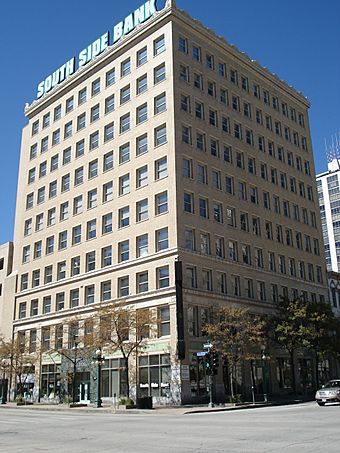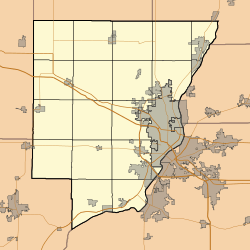Central National Bank Building (Peoria, Illinois) facts for kids
Quick facts for kids |
|
|
Central National Bank Building
|
|
 |
|
| Location | 103 SW Adams St., Peoria, Illinois |
|---|---|
| Area | less than one acre |
| Built | 1913-1914 |
| Architect | G.R. Graham, P. Anderson, Edward Probst (D.H. Burnham Company) |
| NRHP reference No. | 78003450 |
| Added to NRHP | December 18, 1978 |
The Central National Bank Building is a tall, ten-story building in downtown Peoria, Illinois. It stands at 103 Southwest Adams Street. This impressive building was designed between 1913 and 1914. It was created by the famous architectural firm of Daniel Burnham.
Daniel Burnham himself had passed away two years before the building was finished. At that time, his company was the biggest architecture firm in the world! The building shows off a style called Renaissance Revival. This was a very popular design choice back then.
Contents
What Makes the Central National Bank Building Special?
The Central National Bank Building is a great example of early 20th-century architecture. It was built to be a bank, but it also served as an office building. Its design was meant to look grand and important.
A Look at Its Design
The building's design uses many features from the Renaissance Revival style. This style brings back ideas from the European Renaissance period. It often includes classical elements like columns and arches.
Special Architectural Features
- Pilasters: You can see pilasters on the first two floors. These are flat, column-like shapes built into the wall. They help divide the windows and add a sense of order.
- Spandrels: Above the first-floor windows, you'll notice spandrels. These are the decorative panels found between arches or above windows. They often have interesting patterns.
- Terra Cotta: The building also features terra cotta details. Terra cotta is a type of baked clay. It can be molded into many shapes and used for decoration.
- Cornice Lines: There are cornice lines above the second and third floors. A cornice is a decorative molding that sticks out from the top of a wall. It acts like a crown for that part of the building.
Why is it Important?
The Central National Bank Building is important because of its history and design. It shows the architectural trends of its time. On December 18, 1978, the building was added to the National Register of Historic Places. This is a special list of places in the United States that are important to history. Being on this list helps protect the building for future generations.


